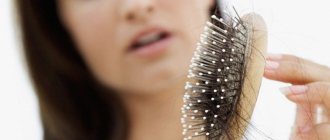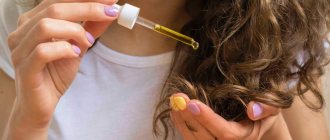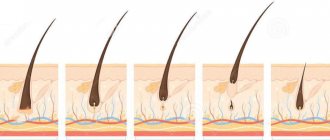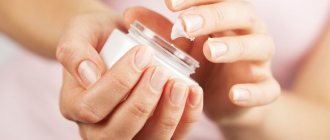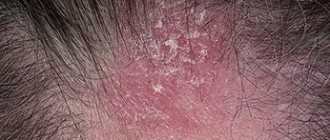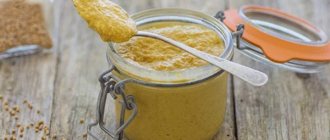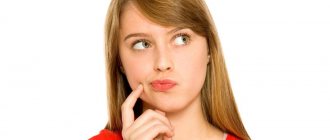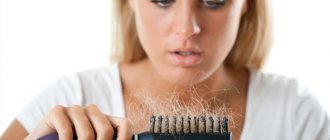Oily shine on the hair, sticky strands, untidy hairstyle, lack of volume and the feeling of an eternally dirty head - all these are signs of increased activity of the sebaceous glands. But oily hair is not a death sentence. Clean Line experts tell you how to properly care for oily hair so as not to dry out your scalp and deprive it of its vibrant shine.
How does oily shine form on hair?
Oily hair is a problem that appears due to increased oiliness of the scalp itself. The roots of the hair have sebaceous glands - they produce an oily substance called sebum or sebum. It is necessary to protect the hair and scalp from dryness, external factors and damage. Accordingly, the more sebum the glands produce, the better the skin and hair are protected. But this also has negative consequences: increased sebum production leads to hair looking dirty and requiring constant washing, and its mixture with horny scales and dirt can clog the pores of the scalp, which leads to dandruff.
What to do if you have oily dandruff on your head?
Any dandruff causes inconvenience to a person, especially oily dandruff, so it is advisable to start treatment immediately after detecting scales on the head. There are many remedies that fight seborrheic dermatitis with varying degrees of effectiveness, and recently oily dandruff has been treated with the antifungal drug ketoconazole. It suppresses the development of colonies of the Malassezia fungus, eliminating the dandruff it causes. (4)
In addition, oily dandruff can serve as an indicator of the presence of concomitant diseases of the digestive, genitourinary, endocrine systems, as well as skin diseases (for example, pityriasis versicolor and various types of dermatitis). Therefore, it is advisable to undergo an examination, which is the key to recovery from seborrheic diseases, since it can identify other diseases and thus eliminate the cause of oily dandruff.
Tip 1: Wash your hair properly
It sounds trivial, because everyone is sure that they properly care for their hair, but the health and beauty of your hair depends on how you wash your hair. It is especially important to pay attention to caring for oily hair.
- Wash your hair with warm water . Hot water stimulates the sebaceous glands, and hair becomes greasy faster. We recommend performing the last rinse with cool water, as this helps to narrow the pores and reduce sebum secretion: the hair will be shiny and stay fresh longer;
- Use shampoo that suits your hair type . To care for oily hair, choose a shampoo for oily hair; for brittle and dry hair, choose one for dry hair. An incorrectly chosen care product can either dry out your hair even more or increase its oiliness. If you have dry ends and oily roots, then it is better to divide washing your hair into two stages: wash the roots with shampoo for oily hair, and the ends - for dry hair. Also, when caring for oily hair, you don’t have to apply balm to the hair roots - this way they will look clean longer;
- Do not rub the shampoo into the scalp , but apply it with massage movements to the roots and distribute along the entire length of the hair. A head massage is not only pleasant, but also useful: you stimulate blood circulation, and the beneficial components of the product used penetrate more actively into the hair follicle;
- Don't wash your hair every day . Many who suffer from oily hair wash their hair every day - this is the main mistake they make. Frequent use of shampoo can cause dry scalp, and will also increase sebum production and make the scalp even more oily. In order to refresh your strands, you can use dry shampoo - it does not harm the hair roots and scalp and will help remove dirt and sebum accumulated on the hair.
Prevention of oily seborrhea
If it is impossible to eliminate the cause of oily dandruff (for example, with a genetic predisposition to the disease), regular prevention comes to the rescue. The most effective is comprehensive prevention, the mandatory components of which should be:
- proper nutrition. Food rich in vitamin A will help you (carrots all year round, and blueberries in summer), but it is better to eat as little fatty and spicy foods as possible, and also eat less fried foods;
- proper hygiene. It is usually not recommended to wash your hair either too often or too rarely, but if you have oily dandruff, washing your hair daily won’t hurt. It is only important to choose a suitable shampoo that will not irritate the skin and will not provoke the growth of fungus. You also need to air your head and walk without a hat whenever the weather permits;
- medicated shampoo with antifungal components ketoconazole, which is used periodically in courses.
Tip 2: Use the right products for oily hair
Choosing the right product to care for oily hair is an important rule that will help reduce the amount of sebum produced. Using the wrong products can make your hair heavier. For example, a large amount of oils in the recipe not only helps to moisturize the scalp, but also increases its oil content, which makes the hair get dirty even faster.
The best advice is to use liquid clear shampoos. Shampoo and conditioner for oily hair Calendula Clean Line control the activity of the sebaceous glands - reduce sebum production and at the same time do not dry out the scalp, moisturizing the hair along the entire length1. Calendula is a necessary component in oily scalp care products. Thanks to the content of salicylic acid, calendula extract can tighten pores and reduce sebum production.
And the flavonoids and tannins in calendula extract will help reduce the number of free radicals and soothe the scalp.
Why does the scalp quickly become oily?
A very oily scalp indicates excessive activity of the sebaceous glands. There are various reasons for this problem, for example:
- diseases of the gastrointestinal tract;
- hormonal imbalances;
- problems with the autonomic nervous system.
The secretion of the sebaceous glands may also increase due to certain habits. This problem is often encountered by those who like head massages, washing their hair with too hot water, regularly visiting the bathhouse, and those whose diet consists of a large amount of fatty foods.
Caring for oily hair at home
properly care for oily hair at home: natural products guarantee gentle care for your scalp and hair. Among the most popular products are cucumber and lemon juices and apple cider vinegar.
Consumer properties were confirmed by testing the “shampoo + balm” complex, personal assessment of 100 women, min 72% agree, Russian Federation, 2016.
Lemon juice
Dilute the juice of one lemon with water and apply to your scalp and hair. Leave the product on for 5 minutes. After 5 minutes, rinse with warm water and shampoo. Lemon juice has a gentle exfoliating effect on the scalp, helping to normalize sebum secretion and equalize pH levels. This citrus is rich in useful components: it contains vitamins A, C, and B vitamins, as well as nicotinic and citric acids.
How to help curls?
What to do if your hair is oily and falling out? Simple self-care rules and modern cosmetics will help correct the situation.
The doctor's consultation
For any hair problem, you should seek medical advice. Curls are a litmus test showing the general condition of the body. Is there something wrong with your hair? This means that there is a significant malfunction in the body.
To help identify the source of the problem:
• therapist; • trichologist; • dermatologist.
In addition, after collecting an anamnesis, the doctor will recommend visiting specialized specialists - an endocrinologist, gynecologist, gastroenterologist, neurologist, etc. First, the doctor will talk with the patient and find out what events have happened in his life over the past six months. This period was not taken by chance - curls react to stress or illness several months later, when the person himself has already forgotten what happened to him. Why does hair have such a delayed reaction? Because the damaging factor will only affect those hairs that will form and sprout under its influence, and the creation of a new hair lasts 3-4 months. After the conversation, an examination is carried out, and blood tests are required (general, biochemistry, hormones, microelements, etc.). A trichologist examines the frequency and pattern of hair growth using trichoscopy. And only on the basis of the data from a comprehensive examination will a conclusion be made about methods of treating increased oiliness of the scalp and curls.
How is sebum hypersecretion treated?
• External agents are often prescribed - medicinal ointments, lotions, balms, etc., which contain zinc, sulfur, and tar. • If necessary, hormonal medications are prescribed to help restore the balance of hormones in the body. • Use antihistamines and corticosteroids to relieve itching and irritation of the scalp. • And finally, vitamin complexes can eliminate the deficiency of certain vital substances in the body. Hair treatment and restoration is not a quick process. However, you should not avoid doctors because of this and prescribe yourself certain medications, especially hormone-containing ones. This can seriously harm your health.
Important! Brittle hair, which quickly becomes greasy and falls out, improves its condition after physiotherapeutic procedures (laser, D'arsonval, electrophoresis , etc. ). However, you should not resort to such methods without consulting a doctor. The effects of physical therapy are not limited to the skin: for example, if your hair is thinning due to thyroid disease, exposure to currents can worsen the problem.
Proper nutrition
If you want to regulate the functioning of the sebaceous glands, you should be patient and willful. Not only because long-term treatment may be needed, but also because it will be necessary to change your habits: both in hair care and in nutrition.
• It is necessary to establish a drinking regime. You should drink enough fluid per day: approximately 40 ml for every kilogram of your weight. Water will make sebum less viscous, remove toxic substances from the body, and improve metabolic processes in the follicle - thereby the oiliness of the scalp and hair will begin to decrease. • It is strictly forbidden to go on diets. Followers of dietary restrictions, vegetarians, vegans are always at risk for developing alopecia. No dieting does not mean overeating. In order for kerato- and sebogenesis to proceed without disturbances, nutrition must be varied and correct. • If your scalp is very oily and your hair is falling out, what should you do? Remember foods from the “black list”: you cannot eat sweets, baked goods, dishes with spices, salty, fatty, fried, smoked, alcohol, soda, coffee. • The basis of a healthy menu is vegetables (fresh, baked, stewed, pickled), fruits, herbs, boiled or baked meat, fish, poultry, foods with a high concentration of nutrients (chia seeds, pumpkin, seaweed, spinach, cranberries, blueberries and etc.). • Do you want strands of normal oil content? Make sure your diet contains foods rich in vitamins A, B, C and E. They improve skin immunity and improve the functioning of the sebaceous glands. Eat carrots, persimmons, liver, sour fruits, and be sure to have enough foods with chlorophyll (i.e., green) - they help these vitamins to be absorbed efficiently.
Important! Deciding to fight the oiliness of their strands, some women exclude fats from their diet. This is wrong: they are responsible for the synthesis of most hormones and their balance in the body; The membranes of all cells, including hair, consist of fats; Without fats, it is impossible to fully absorb vitamins and nutrients. Therefore, give up unhealthy foods (foods overcooked in vegetable oil, sweets), and eat healthy foods (fatty fish, nuts, natural yoghurts) in moderation but regularly.
Competent care
You need to take care of oily scalp at home carefully and carefully so as not to complicate the situation with erroneous actions.
• The main question when your hair becomes oily, falls out and looks like icicles is how often should you wash it? Washing every day makes your hair look fresh, but it overstimulates the sebaceous glands, causing your hair to get dirty faster. What to do? Give yourself time to reset your routine. Start washing your hair every other day, gradually increasing the period without washing to 2-3 days. • Get into the habit of washing your hair in the morning. The sebaceous glands work especially intensively at night. If you also stimulate them by washing them before going to bed, their activity will increase significantly, so there is a risk of waking up again with a dirty head. • Wash your curls with warm water, rinse as cold as you can stand. • Apply shampoo to the scalp and rinse thoroughly with gentle massage movements. Do not rub or scratch the skin. The hair is washed with shampoo twice: during the first time, dirt and grease will swell and get wet, and during the second time, they will be removed from the hair. • Do not take a lot of shampoo and conditioner: for one washing procedure for long hair, a teaspoon of shampoo and three peas of balm or conditioner are enough. • Rinse detergents from your hair 5 times longer than it took to lather. • Dry your hair naturally. In rare cases, use a hairdryer with a diffuser and low temperature. • Comb your curls only twice a day. To avoid touching your hair with your hands, wear your strands in loose, everyday hairstyles.
Important! The hair washing procedure can be completed with herbal rinses: brew sage, mint, birch, wormwood, burdock, calendula. Decoctions soothe, disinfect, and increase the protective functions of the scalp. Blonde hair needs to be careful: herbs can give the strands a peculiar shade.
Final shampoo rating table
| Shampoo | Quality points | Points for value | Points for popularity | Total points |
| Kondor, shampoo “Hop” | 6 | 1 | 2 | 9 |
| OLLIN, Full Force shampoo | 6 | 1 | 3 | 10 |
| INSIGHT, Rebalancing shampoo | 6 | 1 | 3 | 10 |
| Elseve, shampoo “3 valuable clays” | 6 | 2 | 2 | 10 |
| Clean line, “Regulating” shampoo | 6 | 4 | 1 | 11 |
| Natura Siberica, volume and balance shampoo | 6 | 3 | 2 | 11 |
| Vichy, Dercos Oil Control shampoo | 6 | 1 | 4 | 11 |
| Clear, Clear vita ABE shampoo with citrus essence | 6 | 4 | 3 | 13 |
| Pantene, Pro-V Cleansing and Nourishing Shampoo | 6 | 3 | 4 | 13 |
| Estel, Curex Volume shampoo | 6 | 4 | 4 | 14 |
Oily hair is an unpleasant but quite common problem that causes discomfort and self-doubt. Fortunately, today this difficulty can be easily and successfully overcome with the right selection of shampoo. You can restore the natural hydrolipidic balance of the skin, strengthen hair and simulate its growth, relieve irritation, itching, flaking and normalize sebum production after the first wash with a special shampoo - our TOP includes the best products, among which you can choose the right one for yourself option!
Types of seborrhea of the scalp with developed seborrheic dermatitis
Seborrhea on the head has three types:
1) Dry seborrhea.
Accompanied by abundant dandruff, the scalp becomes irritated and very sensitive, hair becomes dry and brittle, and hair loss often begins. Visually, it seems that the scalp does not produce enough oil and many people mistakenly believe that they simply have dry skin, although in fact it is a variant of seborrheic dermatitis.
2) Oily seborrhea.
It often occurs during adolescence, during a period of hormonal imbalance in the body, but can occur at any age. Depending on the composition of sebum, oily seborrhea can be liquid or thick.
- liquid seborrhea is characterized by severe itching and hair loss. Hair acquires an unhealthy shine and becomes greasy very quickly.
- thick seborrhea. A characteristic symptom is thick, oily dandruff, which can tightly clog the sebaceous ducts and thereby provoke inflammation. If complications occur, suppuration may occur at the site of inflammation.
3) Mixed seborrhea.
It is a manifestation of dry seborrhea on the head and oily seborrhea on the face.
How to cure seborrhea?
We tell all our patients who are looking for an answer to the question of how to cure seborrhea about the chronic nature of the process, which is based on the congenital structural features of the sebaceous glands at the genetic level.
In this case, it is only possible to eliminate the external consequences of such hair seborrhea, but there is no treatment for changing the genetic predisposition. Therefore, for seborrhea on the head, treatment should be regular.
Treatment of seborrhea of the scalp involves selecting appropriate remedies for home use, as well as following a number of recommendations that can significantly improve the situation.
In the presence of seborrhea, treatment is most often carried out locally, but there are also drugs for oral administration.
The products of the first group include peelings for the scalp, special shampoos, and leave-in lotions.
Oily seborrhea of the head , the treatment of which should not be delayed, usually requires the use of shampoos with active detergent components, the task of which is to dissolve and remove sebum.
For liquid seborrhea of the scalp, treatment can be supplemented with special masks that are used after shampoo and often contain adsorbent substances, i.e. those that absorb sebum and allow the root part of the hair to maintain a fresh and clean appearance longer. A good addition in the treatment of oily seborrhea of hair can be dyeing or perming (hair straightening), that is, any chemical effect that makes the surface of the hair more porous and better able to absorb excess sebum. Therefore, many visitors who are looking for an answer to the question: “How to treat oily seborrhea?” We recommend contacting our hairdressers to choose a hair coloring procedure. Oily seborrhea, which is treated by our specialists, in addition to external therapy, can also be corrected by taking medications orally. Hormonal contraceptives are most often used as such means, and for liquid seborrhea, treatment often consists of a combination of careful care and selection of a suitable drug that reduces sebum production.
Seborrhea often appears in children during adolescence. Its treatment can be temporary, only for the period of formation of the hormonal system.
It is worth noting that the question “How to treat seborrhea of the head?” The most effective advice may be a simple recommendation to wash your hair more often.
Contrary to widespread belief, washing your hair every day, if required by the nature of the sebaceous gland, is not only harmless, but also necessary to avoid much more serious troubles, for example, seborrheic dermatitis - chronic inflammation of the skin.
